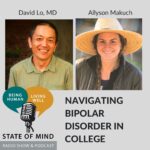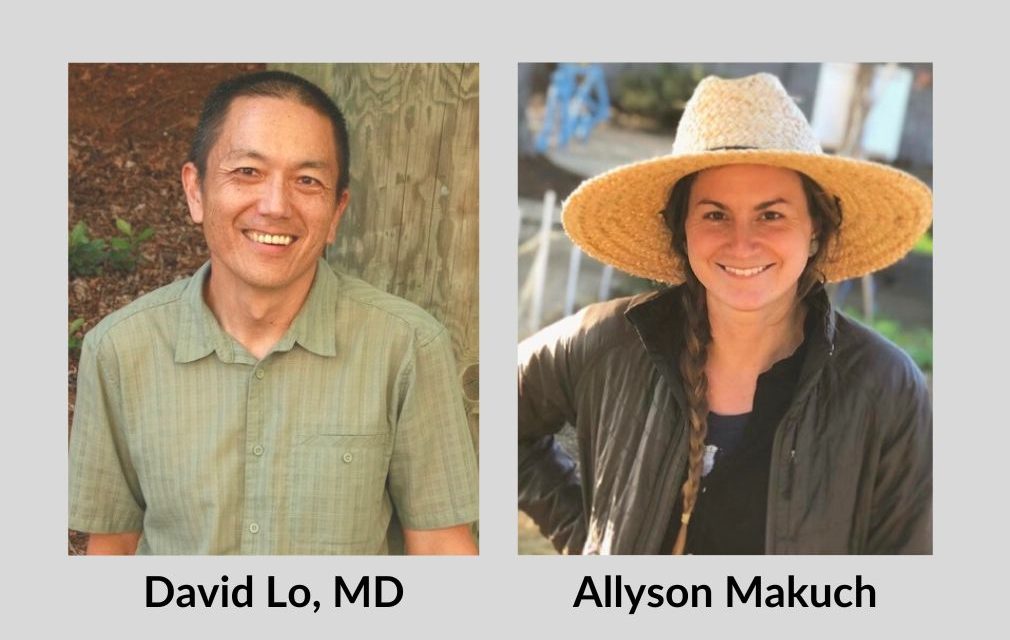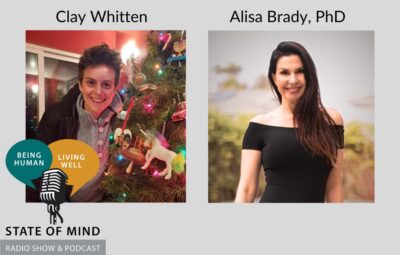
Episode 47: To honor Mental Health Awareness Month, we turn our attention to bipolar disorder, a serious mental health condition that causes extreme mood swings. If not treated and managed, bipolar disorder can be dangerous and cause great disruption in a person’s life. Most mental health disorders have peak onset during young adulthood. So, while beginning college and meeting the new stressors that accompany this transition, many young adults will experience the first onset of problems or an exacerbation of pre-existing symptoms. Students diagnosed with bipolar disorder are 70% more likely to drop out of college than students with no psychiatric diagnosis. Many of these students are going undiagnosed and are not getting the treatment and the support services they need to succeed in college. However, students with bipolar disorder can implement effective treatments, practice management strategies, and seek support in order make progress in their college education. For this conversation, we’re joined by Allyson Makuch, who recently navigated bipolar disorder throughout her college and graduate school years. We’re also joined by a University of California, Santa Cruz Director of Psychiatry, Dr. David Lo, to inform us about bipolar disorder and ways to manage it while in college.
Broadcast: 10/2/22 & 10/10/22
Host: Debra Sloss, LMFT
Guests: Allyson Makuch & Shuyun David Lo, MD
Special thanks to Jeanne Baldzikowski for audio production, Jennifer Young for underwriting outreach, Lisa Herendeen for advance research and Leslie Nielsen for “In Your Voice” Coordination. And thanks to acoustic guitarist Adrian Legg for composing, performing, and donating the use of our theme music.
LISTEN ANYTIME or subscribe to get new or past episodes delivered to your listening device:
Apple Podcasts / Google Podcasts / Spotify / Stitcher / TuneIn
JOIN EMAIL LIST
Want to know our interesting topic each month? Simply SIGN UP for our email list!
FOLLOW US
Facebook @stateofmind.radioandpodcast
Instagram @stateofmind.radioandpodcast
SUGGEST A TOPIC
If you or someone you know has topic ideas for future shows or a story of mental health recovery to share, please email debra.stateofmind@ksqd.org
SHARE YOUR STORY
In Your Voice are short segments on the show where a listener gets to share their experience of the topic we are discussing. You can call us at 831- 824-4324 and leave a 1-3 minute message about: a mental health experience you’ve had, something that has contributed to your mental health recovery journey, or share a resource that has helped you. Alternatively, you can make a 1-3 minute audio recording right on your phone and email that file to debra.stateofmind@ksqd.org. Your voice may just become part of one of our future shows!
SUPPORT OR UNDERWRITE
If you like what you’re hearing here on KSQD, also affectionately called K– Squid, you can become a “Philanthropod on the Squid Squad” by becoming a supporting member and help keep KSQD surfing the air waves! Consider underwriting your business or agency and showing our listeners your support for State of Mind.
RESOURCES
* Indicates Santa Cruz Local
Books & Articles
An Unquiet Mind by Kay Redfield Jamison. This is a trailblazing autobiography of a psychiatrist who also lives with Bipolar 1. Hearing about her recovery journey helped me feel less alone when I first got my diagnosis.
Mind Fixers: Psychiatry’s Troubled Search for the Biology of Mental Illness by Anne Harrington. If you are interested in the history of science and psychiatry, this book provides insightful historical context for modern day psychiatric interventions for bipolar disorder and other mental illnesses.
A Diagnosis of Mental Illness Need Not End a College Career – Short article by Marjorie Baldwin / NAMI.com / March 19, 2018.
Back to school with bipolar? How college can unleash mania – Excellent article describing triggers, ways to manage the illness, identifies risk factors to watch out for and offers links to additional resources. By Michele Hoos / Health.com / September 21, 2010.
Managing My Life With Bipolar Disorder – WebMD short online article with 7 prevention practices to help manage symptoms of Bipolar Disorder. Medically Reviewed by Neha Pathak, MD on February 01, 2022.
Web Resources
The Depression and Bipolar Support Alliance – Focusing solely on depression and bipolar disorders and offering peer-based, wellness-oriented support and empowering services and resources online 24/7, in local support groups, in audio and video casts, or in printed materials distributed by DBSA and their chapters. This is where our guest Allyson attends her support groups.
WRAP (Wellness Recovery Action Plan) – a self-designed prevention and wellness tool that you can use to get well and stay well. Many versions of this and templates to fill out can also be found by searching online for WRAP Plan templates.
Julie A. Fast (@juliefast) on Instagram for tips and reminders on your recovery journey with Bipolar. Julie is a woman with Bipolar 1 who is an advocate and author supporting people with bipolar disorder and their loved ones.
*NAMI Santa Cruz County – Free classes & support groups, crisis information and locally oriented resources and support and advocacy on the countywide level.
NAMI National – Website with extensive information and research on mental health and advocacy at the nation level.
NAMI California – Training, education and mental health advocacy information.
How Do you Treat Bipolar Disorder – Practical information from Mental Health America website about the primary ways to treat and manage bipolar disorder.
Resources Specifically for the University of California, Santa Cruz Community
*Counseling and Psychological Services at University of California, Santa Cruz – Also known as “CAPS,” offers culturally appropriate mental health services to currently enrolled UCSC students only, as well as consultation to faculty, staff, and families.
*Disability Resource Center at University of California, Santa Cruz – Works to assist the UCSC campus with equal educational access for students with disabilities. Supports retention and graduation of students with disabilities, promotes a non-discriminatory campus environment and encourages student development and independence
*Slug Support Program at University of California, Santa Cruz – The UCSC Slug Support Program was created to promote early intervention with students of concern to prevent culminating problems from escalating into a crisis. The goal of the Slug Support Program is to identify students navigating difficult or challenging situations and assist them in resolving their concerns.
*Mental Health Resources for Students at the University of California, Santa Cruz – A comprehensive list of on-campus and off-campus mental health resources specific for college students.
Resources for the Cabrillo College Community
*Accessibility Support Center – Provides services, accommodations, and academic support for students with disabilities (including mental health diagnoses) and learning differences at Cabrillo College. ASC assists the college to meet the requirements ensuring that all programs, services, and activities are accessible to and usable by students with disabilities.
Community Counseling
Family Service Agency (FSA) of the Central Coast is a dedicated underwriter of State of Mind. FSA provides resources, support, and counseling services to adults and children. FSA believes in the power and potential of people of all ages and backgrounds to discover their own creative solutions and welcomes people of diverse cultures, genders, sexual orientations, ages, faiths, socio–economic backgrounds. FSA Counseling Offices offer Medi–Cal, Medicare, and low–cost, sliding scale services in both downtown Santa Cruz 831–423–9444 x200 and in Soquel 831–346–6767 x200.
Contact Guests
*Shuyun David Lo, MD – Can be contacted through Counseling & Psychological Services at University of California, Santa Cruz
*Allyson Makuch – You can hear more of her music at her website here: Echoes and Artifacts
* Indicates Santa Cruz Local












